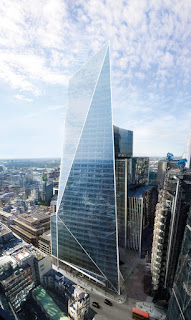The Scalpel: The Newest Spire On London's Skyline

The Scalpel, 52 Lime Street. We've heard of "the Gherkin" and "the Cheesegrater". Now "the Scalpel" has been added to the cluster. Like the nearby "Cheesegrater", the "Scalpel" leans back to protect distant views of St. Paul' s Cathedral. The office block is almost complete. A new Spire on the London skyline! The Scalpel is a commercial skyscraper under construction in London, United Kingdom.It is located on Lime Street in the City of London financial area. Originally a nickname but subsequently designated as its official name, the term "Scalpel" was coined by the Financial Times due to the building's distinctive angular design and followed a trend of nicknaming new buildings based upon their shape, such as the nearby Leadenhall Building, also known as "The Cheesegrater". Upon completion in 2018, The Scalpel will be 190 m (620 ft) tall, with 38 storeys. It has been designed by K








